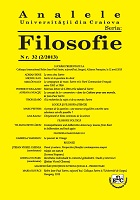LE CONCEPT DE LA « CONVERSION » DANS LES CAHIERS POUR UNE MORALE, DE JEAN-PAUL SARTRE
THE CONCEPT OF "CONVERSION" IN JEAN-PAUL SARTRE’S WORKBOOKS FOR A MORAL
Author(s): Adriana NeacșuSubject(s): Ethics / Practical Philosophy, Ontology
Published by: Editura Universitaria Craiova
Keywords: being-in-itself; being-for-itself; ontological moral; conversion; free; history; social solidarity; Sartre;
Summary/Abstract: In his book Being and Nothingness, Sartre made a plea for a new morality, that to be in harmony with the true ontological status of man, defines in opposition to being-initself, as being-for-itself, so a being which is its own nothingness. He even confesses his intention to write a book aimed the moral domain hat enables deepening the issues of freedom and responsibility. Although Sartre never writes this book, the Workbooks for a moral, published posthumously, are proof of his efforts in this direction. There the philosopher names this new morality "the ontological moral" and he makes the plane of its broad theoretical exposure. He tells us that man, to build this type of morality, must make before a real moral conversion that Sartre connects with pure or not complicit reflection. My research refers to Sartre’s concept of man’s moral conversion, trying to summarize its meaning, content and implications. By this, it wants to show the close connection between ontology and moral within Sartre’s philosophy.
Journal: ANALELE UNIVERSITĂȚII DIN CRAIOVA. SERIA FILOSOFIE
- Issue Year: 2/2013
- Issue No: 32
- Page Range: 52-68
- Page Count: 17
- Language: French

